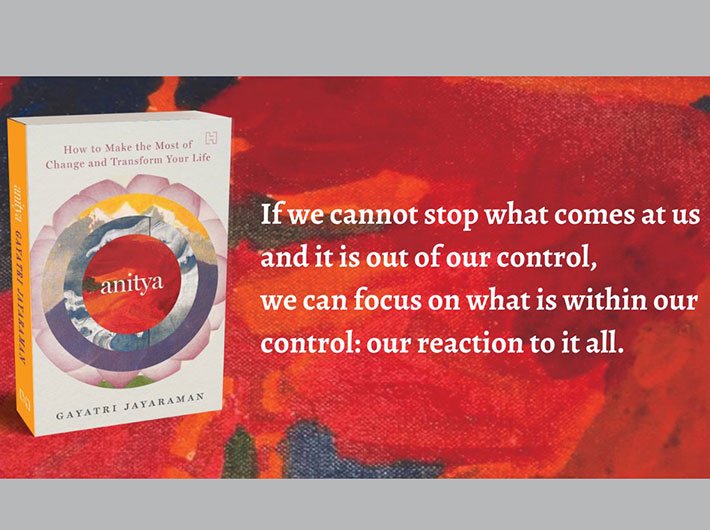BOOK REVIEW: Gayatri Jayaraman’s latest is a reader-friendly introduction to the practice of Buddhism in the guise of a self-help book
ANITYA
By Gayatri Jayaraman
Hachette / 196 pages / Rs. 399
On attaining enlightenment, the Buddha delved in that state for several weeks, before choosing to share the liberating knowledge with people. He turned to the five seekers who had been his fellow travellers, and found them in Sarnath, near Varanasi. To them, he delivered his first discourse, ‘Dharma Chakra Pravartan Sutra’ (to render its title in Sanskrit, meaning Setting in Motion the Wheel of Dharma).
It has, essentially speaking, three parts: The Buddha begins by advising the Middle Path, avoiding the two extremes of sensuous life and self-mortification. Then, he reveals the four Arya Satya, Noble Truths. Finally, he details the fourth of the great truths as the Noble Eight-Fold Path.
This Sutra is not only the first chronologically, but is of supreme importance as a brief statement of the whole dharma. Held in high regard by all schools of Buddhism, it would not be an exaggeration to say that all of Buddhism springs from ‘Dharma Chakra Pravartan Sutra’, or that all the hundreds of the Buddha’s later discourses were only further explanations on the three themes found here.
Gayatri Jayaraman has retold the second of the three themes, the four Noble Truths, in a way that people in need of an anchorage will find utterly helpful.
It was only last year that she had published an unusual, frank and revealing account of her first shivir of Vipassana, translated as ‘Mindfulness Meditation’ or ‘Insight Meditation’, taught by the Buddha. In ‘Sit Your Self Down: A Novice's Journey into the Heart of Vipassana’ (also published by Hachette), with lively prose, she narrated the difficult, arduous process of learning to come to terms with yourself. [Read a review here: https://www.governancenow.com/news/regular-story/a-travelogue-of-an-inner-pilgrimage-vipassana-gayatri-jayaraman] Her latest work takes the project further: Making available Buddhist wisdom to people in need – and everybody is in need of it these days. It’s self-help, but for once, in the true sense of the term.
Jayaraman distils the essence of the four Noble Truths in one word: Anitya, impermanence. Anitya, more memorable in Vipassana acharya S.N. Goenka’s pronunciation of its Pali equivalent, ‘Anichcha’, is one of the three marks of all phenomenal existence. The rest of the ‘Tilakkhana’ are ‘anatta’ (a deeply troubling notion, arguably unique to Buddhism, that there is no self) and ‘dukkha’ (the subject matter of the Four Noble Truths).
‘Dukkha’ is a term that has troubled translators a lot. When the first Noble Truth says life is all ‘dukkha’, some readers can be appalled at the pessimism of terming everything ‘painful’ or ‘suffering’. But it is better understood as an insistent dissatisfaction with life. It can be overcome by accepting the fact of life that everything is, in final analysis, impermanent.
Yet, the Buddha is not pessimist. He says if anything can arise then it can subside too, and so is the case with suffering. That is the third Noble Truth.
Still, it is not a message easy to deliver; there is no way of sugar-coating it. In the face of terrible suffering, when most are looking for a quick fix, the stark advice is: Get real. In turning that into a self-help book, Jayaraman has a difficult task, but again she succeeds in the endeavour with a prose that in itself has calming effect with its undercurrent of empathy. She shares a number of real-life stories, of how people struggled to cope with change and the lessons they drew from them. And then she patiently explains how the four Noble Truths of suffering.
The final part of the book, devoted to the fourth Truth, curiously deals with the Magga, the Path, only indirectly, and not detailing the eight elements of it – Right Effort, Right Speech, and so on. She might have saved it for her third book.
All in all, a sympathetic, reader-friendly introduction to the practice (repeat, practice) of Buddhism in the guise of a self-help book.



